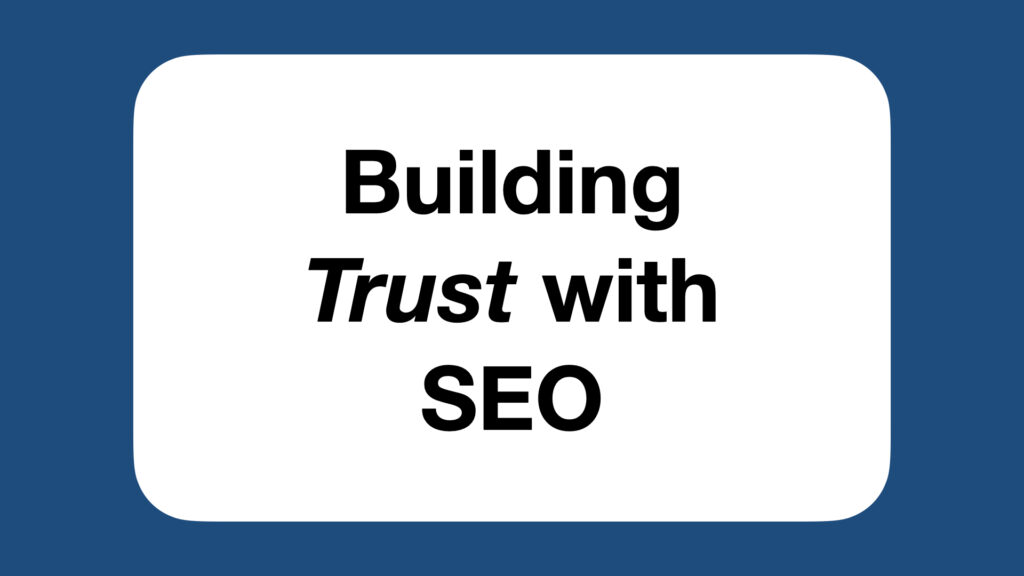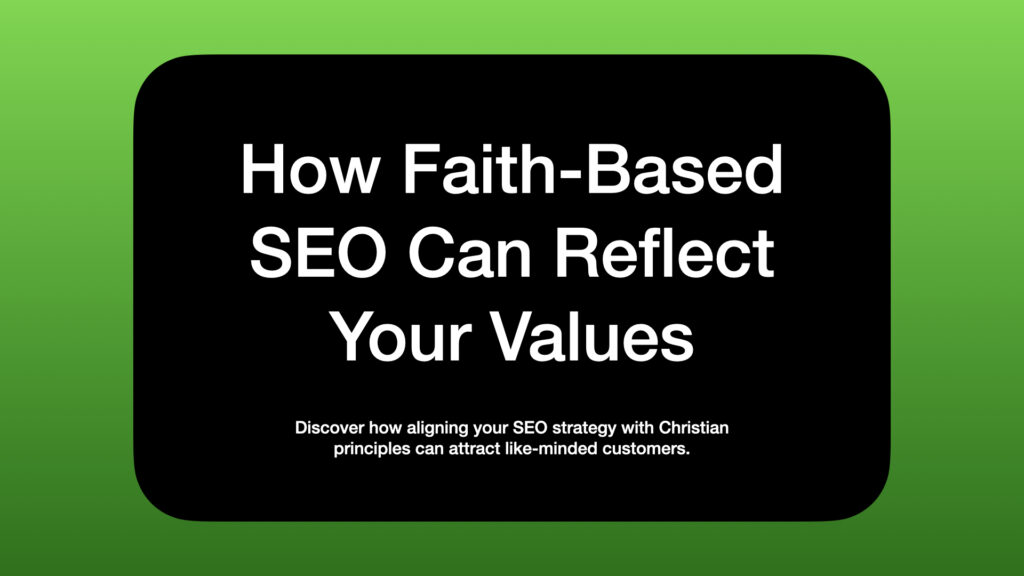
Trust is the foundation of any good relationship, whether it’s with your friends, your family, or your customers. And if you’re a Christian business owner, you know just how important it is to build that trust—both in person and online. But did you know that your SEO (Search Engine Optimization) strategy can actually help you earn that trust, too? Yep, that’s right. When you approach SEO with transparency and integrity, it doesn’t just help you rank higher on Google; it also shows your audience that you’re serious about doing things the right way. Let’s dig into how you can build trust through SEO and connect with your audience in a meaningful way.
Why Trust Matters in SEO
Think about the websites you visit regularly. Chances are, you go back to them because you trust them. Maybe they give solid advice, or they always have accurate information. Google is looking for those same qualities when it decides which sites to rank higher. It wants to send people to websites that are trustworthy and reliable, especially when it comes to businesses offering services.
For Christian business owners, trust isn’t just a buzzword—it’s a core part of how you operate. Your SEO strategy should reflect that same commitment to honesty and integrity. That means no shady tactics or quick fixes that trick search engines. Instead, focus on offering real value to your visitors. When people see that your website is upfront, helpful, and transparent, they’re much more likely to become long-term supporters of your business.
Transparency in Content: Being Real with Your Audience
Let’s be real: no one likes clickbait. You know the type—those headlines that promise the world but don’t deliver. It’s a big turn-off for users, and guess what? Google doesn’t like it either. If you want to build trust, your content needs to be clear and honest from the start.
How to Do It Right: When you write blog posts, service pages, or product descriptions, be upfront about what people can expect. If you’re a Christian counselor, talk about your approach, what sessions look like, and how you integrate faith into your practice. If you run a Christian bookstore, share why certain books are meaningful to you and how they might help your customers. This kind of honesty shows that you care more about helping people than just making a sale.
Also, don’t forget to keep things updated. If you’ve changed your service hours or added a new offering, make sure that information is front and center. It’s a simple way to show that your website is active and that you care about giving people the right information.
Integrity in SEO Practices: No Shortcuts, No Tricks
SEO has its fair share of shortcuts that might seem tempting. We’re talking about keyword stuffing (using the same word over and over), buying backlinks, or creating clickbait content just to get more views. But here’s the deal: those tricks might get you a little traffic in the short term, but they’re not sustainable—and they don’t build trust.
How to Do It Right: Focus on what’s called “White Hat SEO,” which is all about following best practices and playing by Google’s rules. Use keywords naturally, like you’re having a conversation. Build links by forming genuine connections with other Christian websites or local organizations, not by paying for spammy links. It might take longer to see results, but the traffic you get will be more meaningful and more likely to stick around.
For example, instead of stuffing a blog post with keywords like “Christian coffee shop,” aim for a more natural approach. Share a story about what makes your coffee shop special and how your faith plays a role in what you offer. You’ll still be using relevant keywords, but in a way that feels real and inviting.
How Building Trust Helps Your SEO
So, what’s the payoff for doing things the right way? Well, when you build trust with your audience, it has a ripple effect that helps your SEO in multiple ways:
More Clicks and Engagement: If people trust your website, they’re more likely to click through, explore your pages, and stick around for a while. Google pays attention to this—if visitors spend time on your site and click on multiple pages, it signals that your website is valuable.
Positive Reviews: Happy customers often leave positive reviews, and those reviews can be a goldmine for local SEO. When people see that others have had a good experience with your Christian business, it builds even more trust.
Word-of-Mouth Marketing: Trustworthy websites get shared more often, both online and offline. When people find content that’s genuinely helpful, they’re more likely to share it on social media or recommend it to a friend. That means more visitors, more engagement, and ultimately, better rankings.
Tips for Building Trust with SEO
If you’re ready to focus on building trust with your SEO strategy, here are a few tips to get started:
Write Honest Meta Descriptions: This is the little blurb that shows up under your website link in Google. Use it to give people a clear idea of what they’ll find on the page. No clickbait, just the facts.
Include Testimonials: Real stories from satisfied customers go a long way in showing people that you’re the real deal. Include a few on your homepage or create a dedicated page.
Showcase Your Experience: If you’ve been serving your community for years, let people know! Share milestones, certifications, or special projects that highlight your expertise.
Be Transparent About Pricing: If you offer services, consider adding a page that explains your pricing. It might seem risky, but it helps build trust when people know what to expect.
Trust Is Key to Long-Term Success
Building trust through SEO is about more than just pleasing search engines—it’s about connecting with the people you’re here to serve. When you focus on transparency and integrity, you’re not just boosting your online presence; you’re creating a space where people feel welcome, understood, and valued. And that’s what it’s all about, right? After all, a trusted business is one that people will keep coming back to, year after year.












